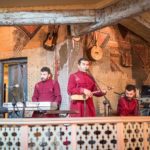Easter in Georgia is a fascinating time of year. As with many Georgian celebrations, Easter has many old Georgian traditions and unique Georgian dishes that are fascinating to discover. In this post (and additional podcast) we delve into the holiest of holidays in Georgia – Easter.
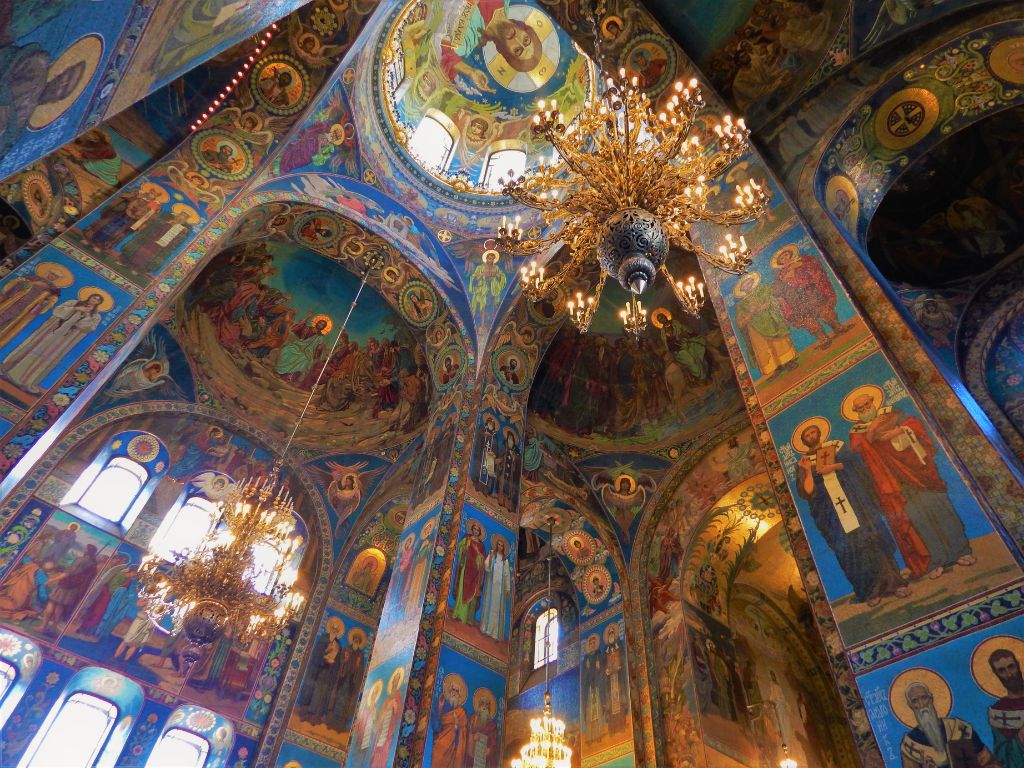
Easter in Georgia
Being one of the first countries in the world to officially adopt Christianity (4th century), religious roots run very deep in Georgia. To Georgians, religion is not something to only be practiced, but is rather intrinsically intertwined with the most fundamental part of Georgian identity itself, and is seen by many as the main reason why Georgia still exists today.
Georgia’s history is scarred by centuries upon centuries of relentless onslaught and invasion, mainly by the Arab/Islamic world. Invaders would force religious conversion to Islam time and time again, but Georgians would never succumb. When destruction and violence were all that the eye could see, Georgians would turn to the only thing they had left: their faith.
Love getting your information in podcast form? Listen to our Full Easter in Georgia Podcast episode on the Tbilisi Podcast:
How is Easter in Georgia different from other Easters?
Although Orthodox Easter in Georgia does share some similarities to other Easters around the world (such as 40 days of fasting or lent), there are some very distinct Georgian Easter traditions. The first major distinction is the difference in the calendar. Countries that celebrate Orthodox Easter (typically most Eastern European countries) follow the Julian calendar instead of the Gregorian calendar used by Catholics and non-Orthodox Christians.
Non-Orthodox (“Western”) Easter occurs on the first Sunday after the first full moon following the spring equinox. Orthodox Easter, however, occurs after the first full moon following the Jewish celebration of Passover (between April 4 and May 8th). The significance of Passover is found in the New Testament of the Bible, where it is stated that the crucifixion and resurrection of Christ took place after he entered Jerusalem to celebrate Passover. Because of this, Orthodox Easter is usually celebrated a week or two later than most Christians in the Western world.
Palm Sunday – Bzoba
Due to the difference in the calendar, Palm Sunday is also celebrated on different days between the two Easters, on the Sunday exactly one week before Easter. On Palm Sunday in Georgia, everyone goes to church and buys small boxwood shrub branches (symbolic of palm trees) and dip them in the church’s holy water. These blessed branches are then taken home and kept until the next Palm Sunday of the following year. According to the Bible, when Jesus entered Jerusalem, he was greeted by people waving palm branches and laying them beneath his path. Taking the branches home is symbolic of welcoming Jesus into our hearts and homes, as well as a token of good luck.
Red Friday – Easter in Georgia
Red Friday, also known as Good Friday in the West, falls on the Friday before Easter. Georgians spend the day dying (chicken) eggs red using onion peels and ground madder root. The deeper the red, the better, as the crimson color represents the blood of Christ that was shed on the day of the Crucifixion. Using ground plants and onion peels is both an ancient Georgian Easter tradition and much healthier than modern chemical dyes.
Georgians also celebrate by either purchasing or growing “Easter grass” also known as ჯეჯილი (Jejili). This small 10 cm high tray of green wheatgrass can either be bought already grown at the local bazaar or cultivated at home by covering a small plate with wet cotton. Wheat seeds are then scattered over the damp cotton and germinated for a couple of weeks.
The dyed red eggs are then placed in the grass blades and used as decoration during Easter week, symbolizing the new life given to humanity by Christ after his resurrection.
Holy Saturday
The Saturday before Easter is considered holy, and Georgians typically celebrate it by meeting Easter at church at midnight in all churches throughout the country. An overnight mass is held with chanting, singing, praying, and communion (bread/wine) continuing until sunrise. The mass usually ends after the Holy Fire is lit and prayed to.
Georgian Easter Sunday
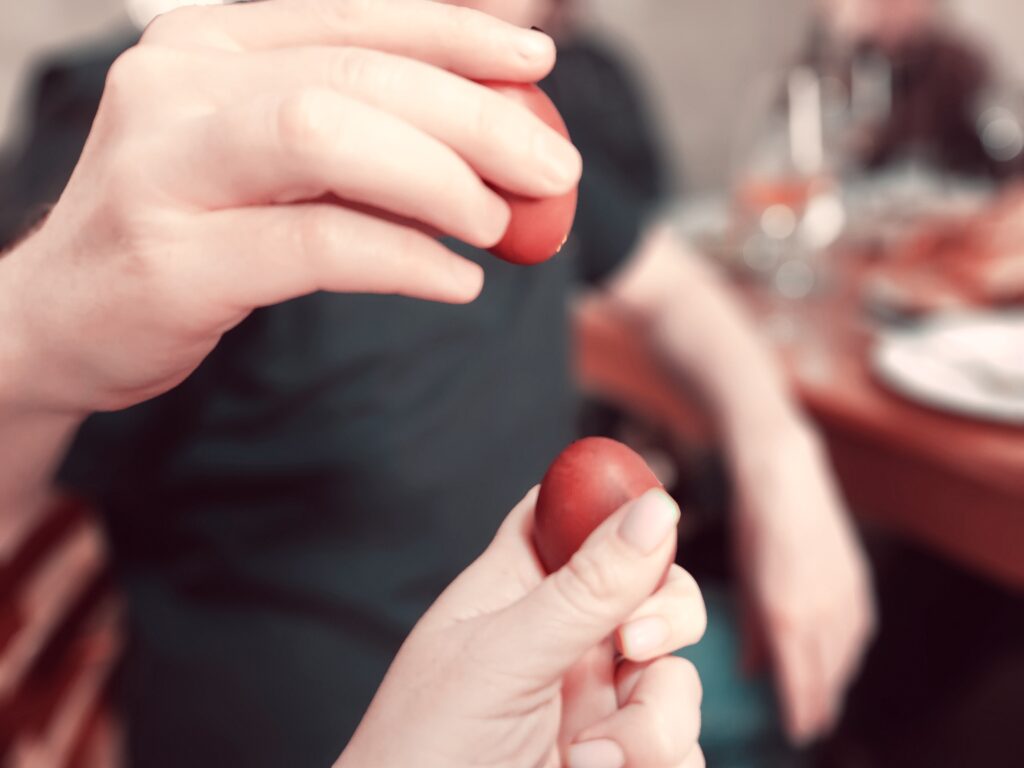
The morning of Easter Sunday usually begins with a small game with the dyed eggs. All members of the household pick an egg and “fight” each other’s eggs by tapping them once on top, one at a time. Whoever’s egg does not crack is deemed the winner. The prize? Being able to claim the remaining eggs! This is a small, lighthearted game for family members of all ages.
The main dish at Easter სუფრა – Supra (feast) is ჩაქაფული (Chakapuli), a famous Georgian lamb stew full of fragrant herbs, tons of tarragon, and unripe (sour) green plums that give it a very distinct, tangy flavor. A vegetarian version of the stew can be made using mushrooms that is as delicious! No supra, especially an Easter one, is ever complete without bread and red wine, representing the body and blood of Christ, respectively.
For dessert, Georgians bake a paska cake. The distinct oval shape of the paska actually carries symbolism and represents Golgotha – the mountain where Christ was crucified.
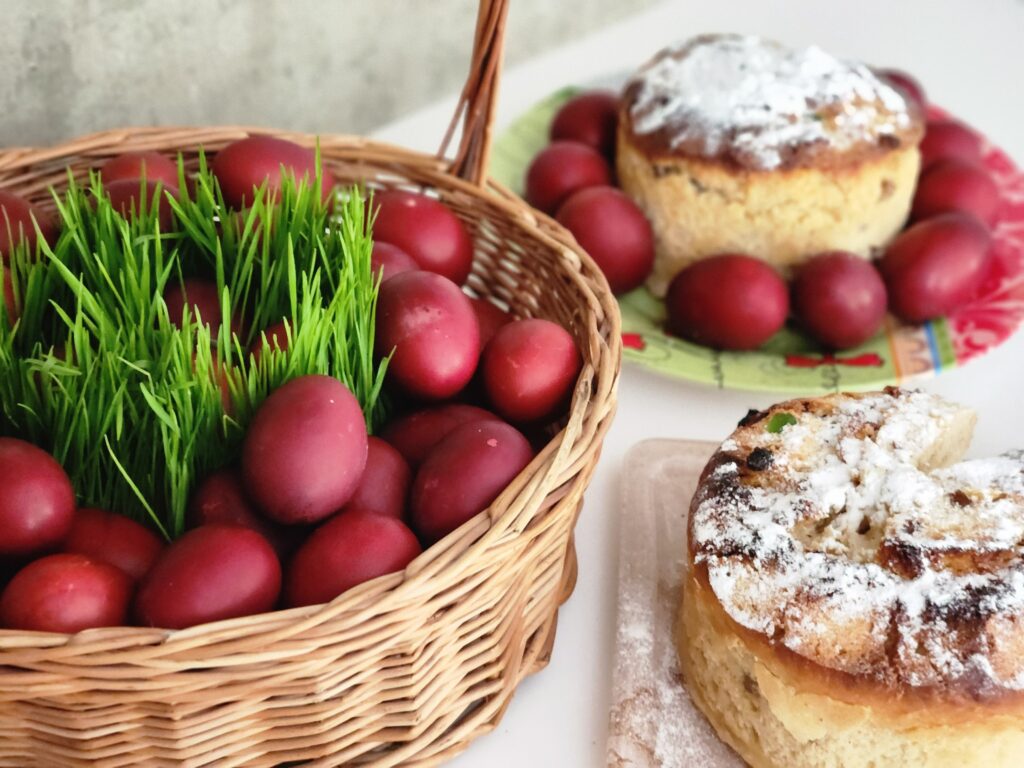
When greeting neighbors, friends, or family members on Easter Sunday, Georgians say “Qriste Aghsgda” meaning “Christ has Risen.” The proper response is saying “Cheshmaritad” meaning “truly, indeed.”
Easter Monday
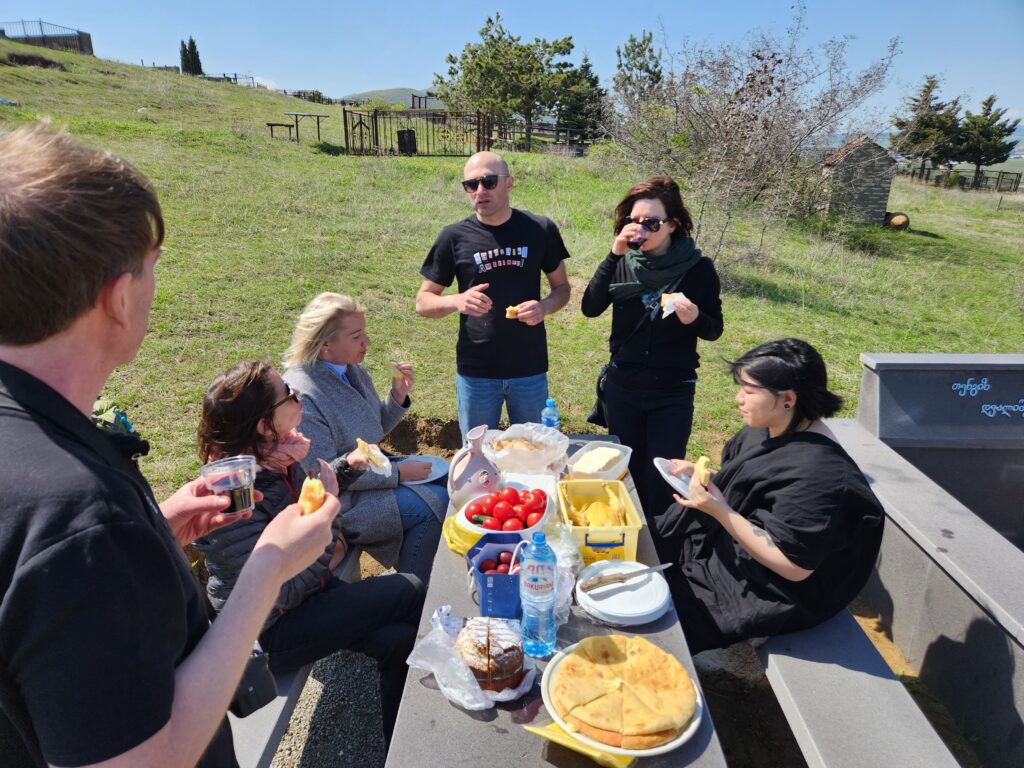
On the Monday after Easter, families usually gather at the cemetery where their loved ones are buried. This tradition actually has roots in the Soviet Union, as religion/church was not allowed, so people would gather at cemeteries instead to celebrate collectively. Candles are lit at each tombstone, and the dyed red eggs are symbolically rolled over the graves of loved ones as a way of “sharing the meal” with them.
A few toasts are shared over wine commemorating those who have passed, and some even pour some wine on top of the graves themselves. Honoring your ancestors and generations that have come and gone are very deeply valued traditions in Georgia.


